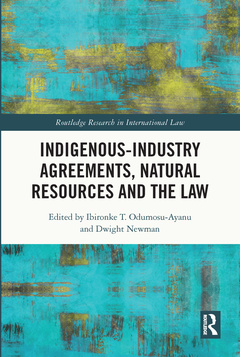Description
Indigenous-Industry Agreements, Natural Resources and the Law
Routledge Research in International Law Series
Coordinators: Odumosu-Ayanu Ibironke T., Newman Dwight
Language: English
Subjects for Indigenous-Industry Agreements, Natural Resources and...:
Keywords
FPIC; Indigenous-Industry Agreements; Treaty Rights; Extractive Industries; Central African Republic; International Law; Vice Versa; Indigenous Peoples; IBAs; Indigenous Rights; Native Title Claim Group; Impact Benefit Agreements; Trans Mountain Pipeline; Oil; Aboriginal Title; Gas; Duty To Consult And Accommodate; Mining; EA Process; Indigenous Governments; Indian Act; Public international law; Benefit Agreements; Indigenous Legal Traditions; Natural resource industry; Native Title Holders; Indigenous Laws; State Investor Contracts; Jurisdictional Case Studies; Land Claims Agreement; Mine Life Cycle; Indigenous Feminisms; Host State Policy; Native Title Rights; Resource Companies; Canadian Environmental Assessment Act
Publication date: 01-2023
· 15.6x23.4 cm · Paperback
Publication date: 12-2020
· 15.6x23.4 cm · Hardback
Description
/li>Contents
/li>Readership
/li>Biography
/li>
This edited collection is an interdisciplinary and international collaborative book that critically investigates the growing phenomenon of Indigenous-industry agreements ? agreements that are formed between Indigenous peoples and companies involved in the extractive natural resource industry. These agreements are growing in number and relevance, but there has yet to be a systematic study of their formation and implementation. This groundbreaking collection is situated within frameworks that critically analyze and navigate relationships between Indigenous peoples and the extraction of natural resources. These relationships generate important questions in the context of Indigenous-industry agreements in diverse resource-rich countries including Australia and Canada, and regions such as Africa and Latin America. Beyond domestic legal and political contexts, the collection also interprets, navigates, and deploys international instruments such as the United Nations Declaration on the Rights of Indigenous Peoples in order to fully comprehend the diverse expressions of Indigenous-industry agreements.
Indigenous-Industry Agreements, Natural Resources and the Law presents chapters that comprehensively review agreements between Indigenous peoples and extractive companies. It situates these agreements within the broader framework of domestic and international law and politics, which define and are defined by the relationships between Indigenous peoples, extractive companies, governments, and other actors. The book presents the latest state of knowledge and insights on the subject and will be of value to researchers, academics, practitioners, Indigenous communities, policymakers, and students interested in extractive industries, public international law, Indigenous rights, contracts, natural resources law, and environmental law.
Part I: Theoretical and Conceptual Frameworks 1.Indigenous-Industry Agreements, Natural Resources and the Law: An Introduction 2. The (Legal) Nature of Indigenous Peoples’ Agreements with Extractive Companies 3. Essential Preconditions for an Indigenous-Industry Agreement with Community Legitimacy 4. Indigenous-Industry Agreements, Legal Uncertainty, and Risk Allocations Part II: Analytical and Critical Perspectives 5. Negotiated Agreements, Indigenous FPIC and the Mine Life Cycle 6. Gender Impact Analysis of Impact Benefit Agreements: Representation Clauses and UNDRIP 7. Who are the Métis? The Role of Free, Prior and Informed Consent in Identifying a Métis Rights-Holder Part III: Politics, Environment and Sustainability 8. The Contentious Politics of Impact and Benefit Agreements: A ‘Sons of the Soil’ Conflict Perspective 9. Impact Benefit Agreements, Transparency, and Sustainability 10. The Relationship between Indigenous-Industry Agreements and Environmental Assessment: Enhanced Credibility and Collaboration, or Undermining the Project Review Process? Part IV: Jurisdictional Case Studies 11. Contesting Indigenous-Industry Agreements in Latin America 12. Is this Really Benefit Sharing? Understanding Current Practices Around Community-Investor Agreements Tied to Land Investments 13. Enhancing the Benefits of Local Content in Extractive Industry Agreements: Legal Approaches and Trends in Frontier Extractive Jurisdictions 14. Indigenous Land Use Agreements in Australia: A Vehicle for Economic Prosperity or an Empty Gesture 15. Canadian Law and Realpolitik Regarding Indigenous-Industry Agreements 16. Towards Comprehensive Engagement: Indigenous-Industry Collaboration in the Resource Sector in Canada
Ibironke T. Odumosu-Ayanu is Associate Professor at the College of Law, University of Saskatchewan, Canada.
Dwight Newman is Professor of Law & Canada Research Chair in Indigenous Rights in Constitutional and International Law at the University of Saskatchewan, Canada.




